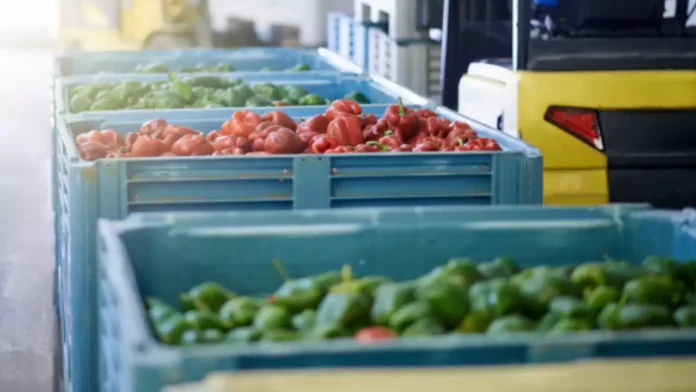According to a Bloomberg report, Turmoil in the Red Sea is beginning to impact the transportation of various commodities, ranging from coffee to fruit. This upheaval poses a threat to the recent easing of food inflation, providing some respite to burdened consumers.
Ships carrying food supplies are steering clear of Houthi attacks in the key waterway by opting for a longer and more expensive route around Africa. However, unlike gas, oil, and consumer goods shipments, the extended shipping times for perishable foods raise the concern of rendering them unsellable.
This is causing concern in the industry. Italian exporters are apprehensive that kiwi and citrus fruits might spoil during transportation, Chinese ginger prices are rising, and certain African coffee shipments faced brief delays. Grain is being redirected away from the Suez Canal, and a livestock carrier en route to the Middle East has altered its course.
Though the impact is currently confined, it serves as a reminder of the vulnerability of food supply chains. If disruptions intensify, there is the potential to halt the decline in food commodity costs that had begun to translate into lower grocery bills.
Continue Exploring: India’s rice trade takes hit from Red Sea unrest, Minister Piyush Goyal calls for assessment
Nitin Agrawal, the managing director of Euro Fruits, a major Indian grape exporter, commented, “Everyone is adversely affected here.” Typically, the company exports to Europe through the Red Sea, but is currently compelled to take the longer route, resulting in more than a quadrupling of freight costs and doubling transit times.
This implies a decline in grape quality, and as per Agrawal, most European importers have consented to elevated prices for Indian grapes. This will result in increased costs for consumers. The European Union typically depends on India for approximately one-seventh of its table grapes, with the proportion rising to over 35% during the crop’s peak in March-April, as reported by the European fresh produce association Freshfel.
Shipping Challenges Affecting Meat and Agricultural Exports
Concerns are growing among Italian exporters, who annually sell approximately $4.4 billion worth of agricultural produce to Asia. Massimiliano Giansanti, the president of the farm group Confagricoltura, expresses worry that opting for the longer route around Africa may compromise the freshness of fruits such as apples, kiwi, and citrus, leading to increased costs. Additionally, there are similar concerns for meat shipments, particularly India’s buffalo-meat exports bound for regions like North Africa, which are experiencing delays, according to Fauzan Alavi, spokesperson for the All India Buffalo and Sheep Meat Exporters Association.
Farmers may find themselves in a challenging situation, contemplating the need to reduce their prices to offset the increased shipping costs.
“We have to sell even if prices fall as we can’t prolong the harvesting period,” said Sandeep Dagu Sandhan, a grape grower in India’s state of Maharashtra, where harvesting has started in some areas. “Exporters always manage to cover their costs. It will be our losses if prices crash.”
Tesco Warns of Inflation, Sainsbury Addresses Delays
The shipping challenges are causing apprehension for Europe’s exports, including products such as pork, dairy, and wine, as well as imports like tea, spices, and poultry. The exact extent of the impact remains uncertain, according to CELCAA, representing agri-food traders. Intelligence firm Kpler reported that approximately 1.6 million tons of grain destined for the Suez Canal have been redirected to alternative routes in recent weeks. The majority of these shipments are grains headed for China and Southeast Asia.
UK grocery giant Tesco Plc has issued a warning about potential inflation on certain goods due to shipping disruptions. In response to the challenges, J Sainsbury Plc is actively working with the government to address and manage potential delays in their operations.
Continue Exploring: US retailer Target grapples with shipment disruptions from India and Pakistan amid Red Sea crisis
Fresh ginger prices at East London’s New Spitalfields Market have surged by over a third since December. Muhammed Patel from the wholesaler Amer Superfresh Ltd., which typically procures from China, noted that suppliers are increasing costs to accommodate the extended transportation distances.
“Every now and then we have delays, but nothing like this,” Patel said.
Certain traders have gone as far as postponing the loading of cargoes. Mercanta, a UK-based coffee importer, temporarily suspended loading operations in East Africa as it awaited clarification on the chosen route by carriers. Although they have resumed loading, any persisting delays could impede sales to Europe. This comes at a time when shipments in the Americas are also encountering limitations, including issues at the Panama Canal.
If a cargo heads south, “it’ll have to go on a very, very long transit and probably be more expensive,” Mercanta founder and managing director Stephen Hurst said.
Coffee Importers Navigate Challenges in Supply Chains
Countries such as Uganda and Vietnam play a substantial role in Europe’s coffee imports, with the Red Sea serving as a crucial artery for this trade.
The Vietnam Coffee Cocoa Association notes a shift in some companies opting for bulk carriers to transport coffee, despite the conventional use of containers for perishable foods. This transition can complicate handling at locations such as ports and increase susceptibility to damage from environmental factors.
Importers are actively pursuing increased supplies of robusta, the beans utilized in instant coffee, from Brazil, disrupting the usual patterns of trade.
Pink salt from Pakistan is another example of the challenges in the market. According to Majid Mahboob Paracha, the manager of international trade at Shahpur Industries, buyers are shrinking their customer base. This is primarily because they are unwilling to bear the higher transport rates, with the costs of shipping a container to Europe currently quadrupling the norm.
“We have the product, but if they are not comfortable with the freight charges, we cannot force them,” he said.





